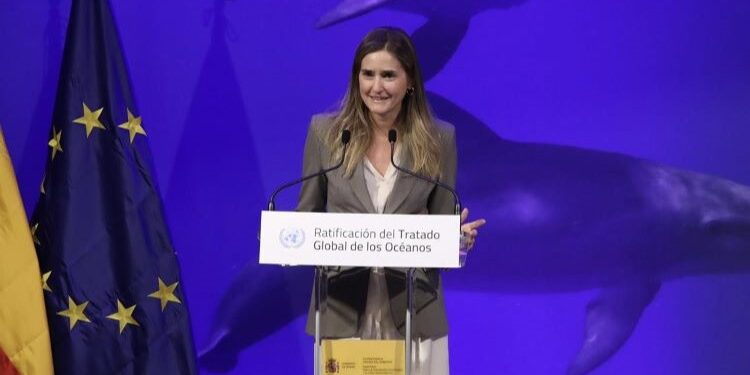The Diplomat
Spain has ratified this Tuesday the Treaty on Marine Biological Diversity in areas beyond National Jurisdiction (High Seas Treaty or BBNJ), thus becoming the first country in the European Union to ratify this agreement.
This was announced by the Vice President of the Government and Minister for the Ecological Transition and the Demographic Challenge, Sara Aagesen, after the deposit of the instrument by the Ministry of Foreign Affairs at the headquarters of the United Nations, in New York.
“Today our country once again demonstrates, through actions, its commitment to the environmental agenda, to multilateralism and to a global project where the search for prosperity for all goes hand in hand with the necessary protection of global public goods,” declared the Vice President at a press conference, accompanied by Juan Carlos del Olmo, Secretary General of WWF Spain, and Eva Saldaña, Executive Director of Greenpeace Spain.
The BBNJ establishes a robust legal framework for all activities in the ocean and seas: it regulates human activities on the high seas, allows for their protection through the designation of marine protected areas and establishes a mechanism for equitably sharing the benefits derived from the exploitation of marine genetic resources. It is a normative development of the environmental aspects provided for in the United Nations Convention on the Law of the Sea (UNCLOS).
Specifically, this framework assumes the commitment to declare 30% of the surface of the high seas as a protected area before 2030. The treaty will therefore play a crucial role in achieving the global 30×30 objective agreed during the Kunming-Montreal Global Biodiversity Framework.
For the treaty to enter into force, it must be ratified by at least 60 countries. Once this number is reached, 120 days must pass. Chile, which is bidding to host the BBNJ headquarters, was the first country to ratify. It did so a year ago, on February 20, 2024. According to the United Nations registry, in addition to Spain, 15 countries have already ratified: Bangladesh, Barbados, Belize, Chile, Cuba, Maldives, Mauritius, Micronesia, Monaco, Palau, Panama, Seychelles, Singapore, St. Lucia, Timor-Leste.
The President of the Government, Pedro Sánchez, signed the BBNJ in September 2023, when Spain chaired the Council of the European Union. After this signature, the Ministry for the Ecological Transition and the Demographic Challenge (MITECO) and the Ministry of Foreign Affairs raised the agreement to refer the BBNJ to the Cortes on July 9, 2024, to the Council of Ministers. Subsequently, once the authorization of the Cortes had been obtained, Foreign Affairs raised the agreement to formalize the ratification with the deposit of the instrument today, February 4, 2025.







